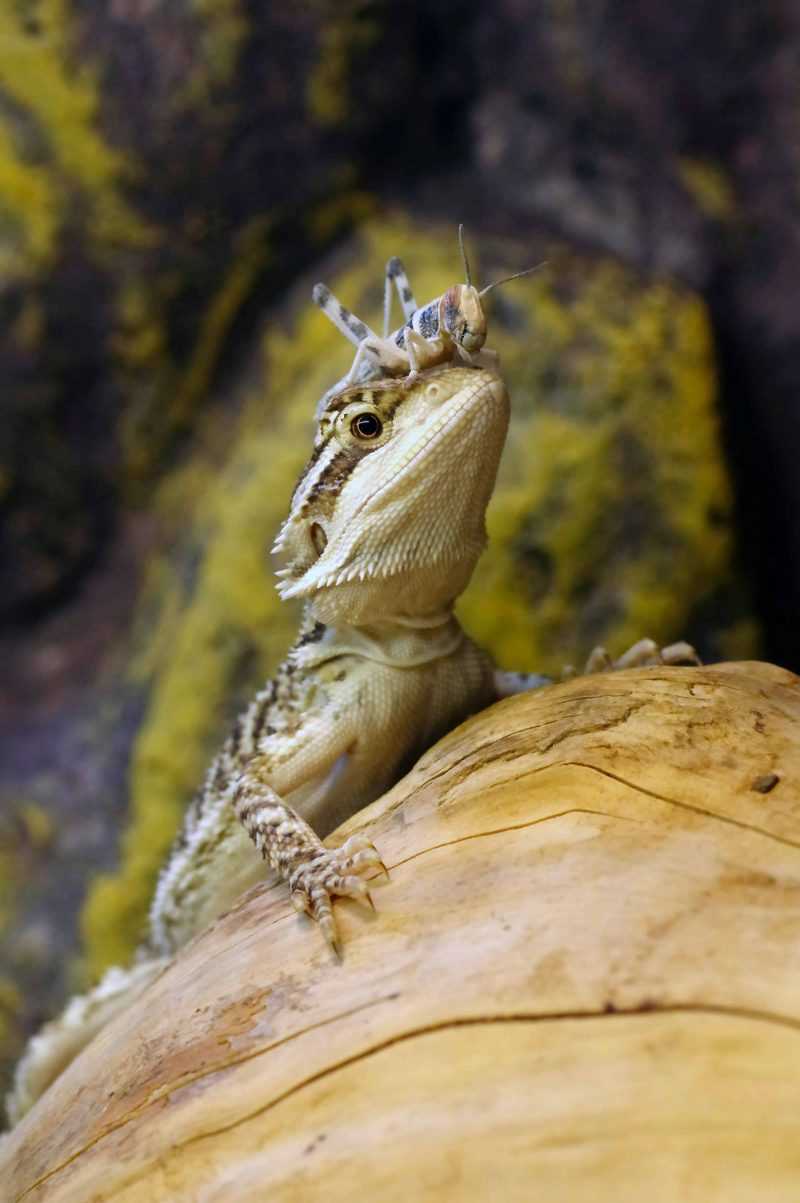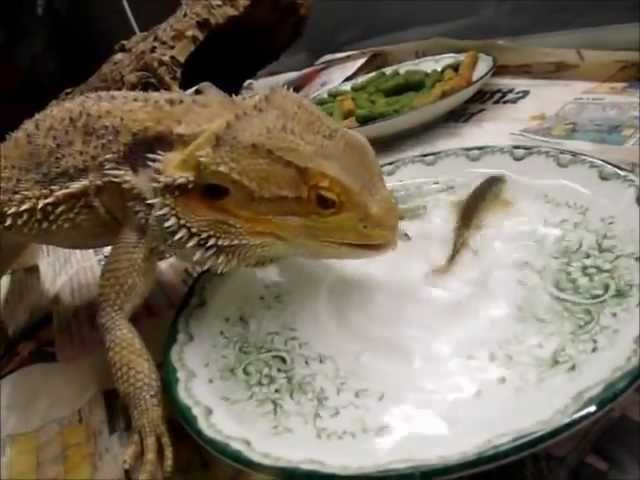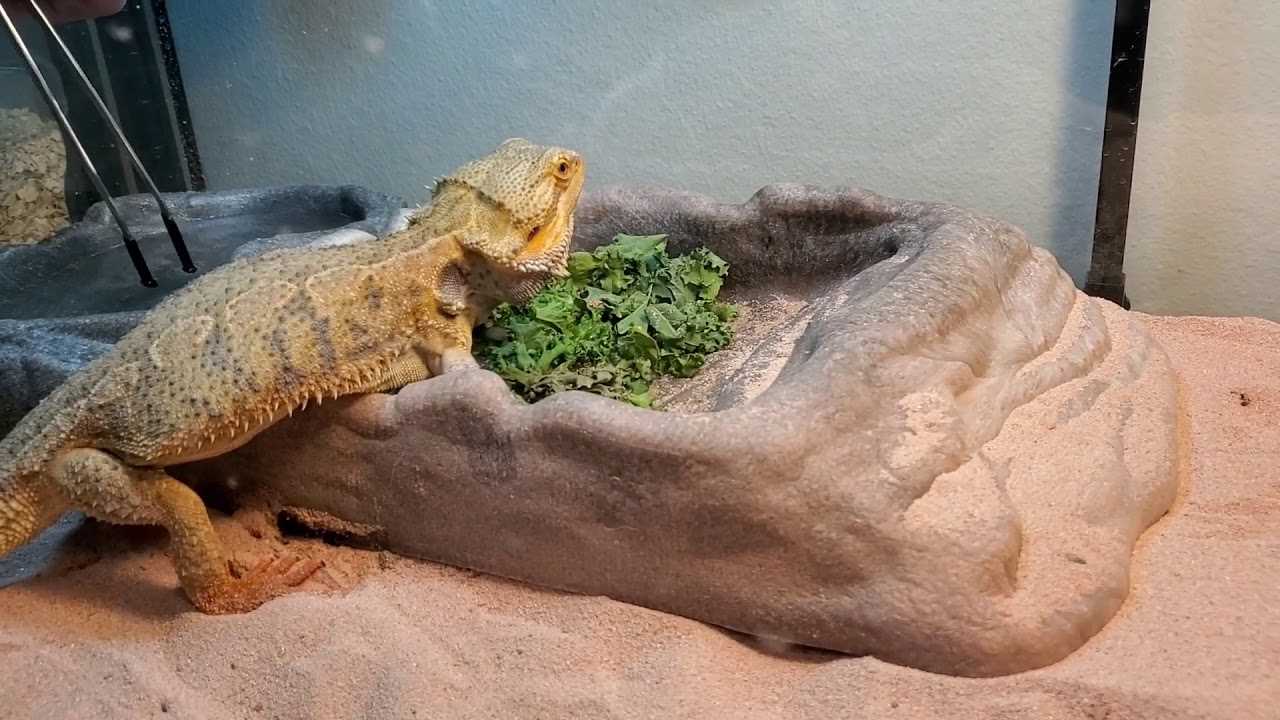What Do Bearded Dragons Eat?
Bearded dragons are omnivorous reptiles, which means they can eat both plant matter and animal protein. However, their diet should consist mainly of insects and vegetables, with a smaller portion of fruits and occasional treats.
2. Vegetables: Leafy greens such as collard greens, kale, mustard greens, and dandelion greens should make up the majority of a bearded dragon’s vegetable intake. These greens are high in calcium and other nutrients. Other suitable vegetables include squash, bell peppers, carrots, and peas. Vegetables should be finely chopped or shredded for easier consumption.
3. Fruits: Fruits should only be offered as occasional treats due to their high sugar content. Suitable fruits for bearded dragons include apples, berries, melons, and mangoes. It is essential to remove any seeds or pits from the fruits before feeding them to your dragon.
4. Supplements: Bearded dragons require additional supplementation of calcium and vitamin D3 to support their bone health. Calcium powder should be dusted over their food at every feeding, while vitamin D3 can be provided through natural sunlight or UVB lighting.
Can Bearded Dragons Eat Fish?
One common question that reptile owners often have is whether or not their bearded dragons can eat fish. While bearded dragons are omnivorous and can eat a variety of different food, fish is not a recommended part of their diet.
While fish can provide a source of protein for bearded dragons, it is generally recommended to avoid feeding fish to these reptiles due to the potential risks. Instead, it is best to stick to a diet that consists primarily of insects, such as crickets, mealworms, and superworms. These insects provide the necessary protein and nutrients that bearded dragons need to thrive.
It is also important to provide a variety of vegetables and fruits to ensure a well-rounded diet for your bearded dragon. Dark leafy greens, such as collard greens or mustard greens, are excellent options, as well as carrots, bell peppers, and squash. Fruits like blueberries and strawberries can be given in moderation as treats.
In addition to a balanced diet, it is crucial to provide proper supplementation for bearded dragons. Calcium and vitamin D3 are essential for these reptiles’ bone health and metabolism. Dusting their food with a reptile calcium supplement containing vitamin D3 is recommended, especially for young bearded dragons and those that do not have access to natural sunlight.
Overall, while fish may seem like a tempting option for bearded dragons, it is best to avoid feeding them this type of food. Stick to a diet primarily consisting of insects, supplemented with a variety of vegetables and fruits. By providing a balanced and varied diet, you can help ensure the health and well-being of your bearded dragon.
The Risks of Feeding Fish to Bearded Dragons

While some reptiles can safely consume fish as part of their diet, it is generally not recommended for bearded dragons. There are several reasons why fish may not be suitable for bearded dragon consumption.
1. Nutritional Imbalance:
Fish do not provide the same balanced nutritional profile that insects and vegetables do. Bearded dragons require a diet that is rich in calcium, and fish do not naturally contain high levels of this important mineral. Additionally, fish are typically high in fat, which can lead to obesity in bearded dragons if consumed regularly.
2. Potential for Parasites:
3. Allergies and Sensitivities:
Just like humans, bearded dragons can develop allergies or sensitivities to certain foods. Fish is known to be a common allergen for some reptiles, and feeding it to your bearded dragon could potentially cause an adverse reaction or digestive issues.
4. Potential Toxin Exposure:
Some fish species, especially those that are caught in polluted water sources, can contain toxins such as heavy metals or chemicals. These toxins can accumulate in the tissues of the fish and may be harmful to your bearded dragon if consumed.
Given these risks, it is generally recommended to avoid feeding fish to your bearded dragon. Instead, focus on providing them with a balanced diet that consists of a variety of insects, vegetables, and supplemental calcium and vitamin D3 to ensure their overall health and well-being.
Recommended Alternatives to Fish for Bearded Dragons
Can bearded dragons eat fish? While fish can be an occasional treat for your bearded dragon, it is not recommended to make it a staple part of their diet. There are several reasons why fish should be avoided or only given sparingly to your pet reptile.
Firstly, fish may contain high levels of heavy metals and toxins that can be harmful to bearded dragons. These contaminants can accumulate in the dragon’s body over time and lead to health issues. Additionally, fish may also contain harmful parasites or bacteria that can cause infections or digestive problems in bearded dragons.
Furthermore, fish can be a choking hazard for bearded dragons due to their small and irregularly shaped bones. Ingesting these bones can cause injuries or blockages in the dragon’s digestive system, leading to serious health complications.
Instead of fish, it is recommended to provide your bearded dragon with a varied diet consisting of other protein sources. Some suitable alternatives include insects like crickets, mealworms, and dubia roaches. These insects are rich in nutrients and are closer to the natural diet of bearded dragons in the wild.
In addition to insects, you can also offer your bearded dragon other protein-rich foods such as cooked chicken or turkey, scrambled eggs, or even small amounts of lean beef. These options provide a good balance of protein without the potential risks associated with fish.
The Importance of a Varied Diet for Bearded Dragons
Eating a range of foods helps to provide bearded dragons with the vitamins, minerals, and nutrients they need for growth, development, and maintenance of their bodies. A varied diet also helps to prevent nutritional deficiencies and strengthen their immune system, making them less susceptible to diseases and illnesses.
By offering a wide range of foods, you are not only providing the necessary nutrients but also ensuring that your bearded dragon gets to experience different tastes and textures. This helps to keep them interested in their food and prevents them from becoming bored or disinterested in eating.
It is essential to monitor your bearded dragon’s diet and make adjustments as needed. If you notice any signs of nutritional deficiencies, such as weak bones or lack of energy, it may be necessary to supplement their diet with additional vitamins or minerals. Consulting with a reptile veterinarian can help ensure that your bearded dragon is receiving a proper and balanced diet.
How Often Should You Feed Your Bearded Dragon?
One of the most important aspects of caring for a bearded dragon is ensuring they have a healthy and balanced diet. Feeding your bearded dragon the right amount and frequency of food is crucial to their overall well-being.
So, how often should you feed your bearded dragon? The answer depends on their age. Young bearded dragons should be fed more frequently than adult dragons. Generally, young dragons should be fed a variety of insects two to three times a day. This allows them to grow and develop properly.
In addition to knowing how often to feed your bearded dragon, it’s also important to provide a variety of food options. Bearded dragons are omnivores, meaning they can eat both plant material and animal proteins. A well-rounded diet for a bearded dragon should include a mix of insects, like crickets and mealworms, as well as fresh fruits and vegetables.
It’s also crucial to provide proper calcium and vitamin D3 supplementation for your bearded dragon. These nutrients are essential for their bone health and overall well-being. Dusting their food with a calcium powder or providing a calcium supplement can help ensure they are getting the necessary nutrients.
Overall, establishing a regular feeding schedule and providing a varied diet are key factors in maintaining the health of your bearded dragon. By following these guidelines, you can help ensure that your dragon is happy, healthy, and thriving.
Tips for Feeding Bearded Dragons
Properly Prepare Food: Before offering any food to your bearded dragon, make sure it is properly prepared. This means washing fruits and vegetables thoroughly to remove any pesticides or chemicals and gut-loading insects with nutritious foods before feeding them to your reptile.
Offer a Balanced Diet: A balanced diet for a bearded dragon should consist of approximately 80% vegetables and 20% protein. Leafy greens like kale, collard greens, and mustard greens should make up the majority of the vegetable portion, while protein sources can include crickets, mealworms, and dubia roaches.
Supplement with Calcium: Bearded dragons require a high calcium intake to support their bone health. Dusting their food with a calcium supplement, such as calcium powder or calcium-rich multivitamin powder, can help ensure they are getting enough of this essential nutrient.
Provide Fresh Water: While bearded dragons obtain most of their hydration from the food they eat, it’s still important to provide a shallow dish of fresh water for them to drink from. Make sure to change the water daily to prevent bacterial growth.
Be Mindful of Temperature: Bearded dragons are ectothermic, meaning they rely on external heat sources to regulate their body temperature. Ensure that the temperature of the environment and the food offered to your reptile are appropriate for their well-being.
By following these tips, you can ensure that your bearded dragon is getting the nutrition it needs for a healthy and happy life.
The Role of Calcium and Vitamin D3 in Bearded Dragon Nutrition
Proper nutrition is essential for the health and well-being of bearded dragons. One crucial aspect of their diet is the presence of calcium and vitamin D3.
Calcium:
Calcium is vital for bearded dragons as it supports their bone growth and development and helps maintain proper muscle function. It is crucial to provide a sufficient amount of calcium in their diet to prevent metabolic bone disease, a common condition in reptiles caused by a calcium deficiency.
There are several ways to ensure your bearded dragon gets enough calcium:
1. Calcium-rich Foods:
Include calcium-rich foods, such as dark leafy greens like kale and collard greens, in your bearded dragon’s diet. Calcium powders and supplements specifically designed for reptiles are also available and can be sprinkled on their food.
2. Gut-loading:

3. Dusting:
Dust live insects with a calcium powder before feeding them to your bearded dragon. This additional calcium boost is beneficial, especially for growing dragons.
Vitamin D3:
Vitamin D3 is essential for bearded dragons as it aids in calcium absorption and regulates the levels of calcium and phosphorus in their bodies. Without enough vitamin D3, your dragon may not be able to properly utilize the calcium it consumes, leading to potential health issues.
There are two primary sources of vitamin D3 for bearded dragons:
1. Natural Sunlight:
Bearded dragons require exposure to natural sunlight to synthesize vitamin D3 in their skin. The UVB rays in sunlight trigger the production of this crucial vitamin. Allowing your dragon to spend time outdoors in a secure, supervised environment is an excellent way to ensure they receive adequate vitamin D3.
2. UVB Lighting:

If natural sunlight is not readily available, you can use UVB reptile lamps to provide the necessary UVB rays for vitamin D3 synthesis.
Note: It’s crucial to monitor the temperature and UVB levels in your bearded dragon’s enclosure to create an optimal environment for them.
Overall, a balanced diet that includes calcium-rich foods and provides adequate vitamin D3 is essential for the optimal health and development of your bearded dragon. Consult with a reptile veterinarian or a herpetologist for specific dietary recommendations based on the age and health of your dragon.
The Role of Calcium and Vitamin D3 in Bearded Dragon Nutrition
Bearded dragons can eat a variety of foods to maintain a balanced and healthy diet. One crucial aspect of their nutrition is the intake of calcium and vitamin D3. These nutrients play a vital role in keeping bearded dragons strong and preventing potential health issues.
Calcium is essential for the proper development and maintenance of a bearded dragon’s bones and teeth. It helps to prevent bone diseases and ensures the skeletal structure remains robust. Without sufficient calcium intake, bearded dragons may suffer from metabolic bone disease, which can lead to deformed bones, fractures, and even death in severe cases.
Vitamin D3 is necessary for the absorption and utilization of calcium in the body. Bearded dragons require exposure to UVB light to synthesize vitamin D3 naturally. UVB light stimulates the production of a precursor to vitamin D3 in the skin, which is converted to the active form with the help of heat. This conversion allows the body to absorb calcium efficiently.
In the wild, bearded dragons bask in the sun to obtain UVB light and regulate their vitamin D3 levels. However, for captive bearded dragons, it is crucial to provide UVB lighting in their enclosures to ensure they receive adequate amounts of UVB light for the production of vitamin D3. Without proper exposure to UVB light, bearded dragons can develop vitamin D3 deficiency, leading to calcium absorption issues.
When dusting their food, bearded dragons should receive a light dusting of calcium powder with vitamin D3 a few times a week. This routine helps maintain their calcium levels within the appropriate range and prevents deficiencies. However, it is crucial not to over-supplement with calcium, as it can lead to imbalances and health issues.
Other Foods to Avoid Feeding Your Bearded Dragon
- Insects and Fruits with High Acid Content: Bearded dragons cannot tolerate high acid levels, so it is best to avoid feeding them insects or fruits with high acid content like oranges, lemons, and grapefruits.
- Wild-caught Insects: Insects that are caught in the wild may have been exposed to pesticides or other harmful substances. It is best to feed your bearded dragon commercially bred insects to ensure their safety.
- Meat and Dairy Products: Bearded dragons are herbivores and their digestive systems are not designed to handle meat or dairy products. Feeding them these types of foods can lead to digestive issues.
- Foods with High Fat Content: Bearded dragons require a low-fat diet, so it is best to avoid fatty foods like avocado, nuts, and seeds.
- Processed or Junk Foods: Just like with humans, processed and junk foods are not healthy for bearded dragons. These foods are often high in salt, sugar, and unhealthy fats, and can lead to various health issues.
- Plants or Insects from Your Garden: While it may be tempting to feed your bearded dragon plants or insects from your garden, there is always a risk that they have been exposed to pesticides, fertilizers, or other harmful chemicals.
- Large or Hard Foods: Bearded dragons have small mouths and teeth, so it is best to avoid feeding them large or hard foods. These can cause choking or dental problems.
By avoiding these foods and providing a balanced and varied diet, you can ensure the health and well-being of your bearded dragon. Always consult with a reptile veterinarian or specialist for specific dietary recommendations for your pet.

I’m Lena Adams—a product of an unconventional upbringing in the African wilderness. My father, a daring explorer of African wildlife, sparked my fascination with reptiles, a passion that intertwined with the tragic loss of my mother during an expedition, leaving an indelible mark on my life. Driven to understand the creatures that captivated my parents, I embarked on my journey, sharing insights about reptiles, frogs, and lizards on my website. Through my explorations and conservation efforts, I honour my family’s legacy while seeking connections—to the creatures, nature, and the mother whose presence I yearn to understand.
